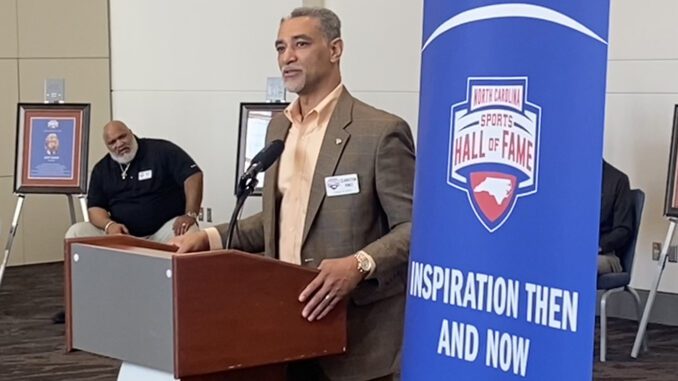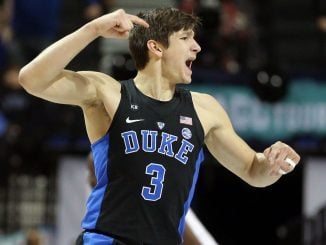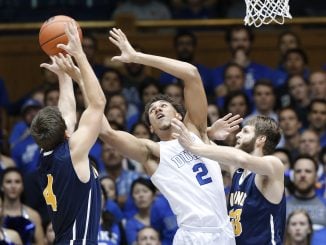
RALEIGH — The first time Clarkston Hines met the Ol’ Ball Coach, he didn’t know Steve Spurrier would end up being his ball coach.
“I remember exactly where I was when it was announced that Coach Spurrier was going to be our head coach,” Hines recalled. It was following his freshman year at Duke, where he had just three catches for nine yards in 11 games under coach Steve Sloan.
“Now flash back three years earlier,” Hines continued. “I was in high school, and I went to my only USFL football game. Coach Spurrier’s Tampa Bay Bandits playing the Jacksonville Bulls.”
It was a night game at the Gator Bowl that attracted 71,000 fans.
“I went to high school in Jacksonville,” Hines said. “It’s the only USFL game that I ever went to, and I remember seeing footballs thrown all over the field. I mean, just the receiver’s dream.”
By modern standards, the game may not seem like much of a shootout. The two teams combined for 60 passes, 38 completions, 569 yards and three touchdowns, including a 39-yarder and a 30-yarder. Offenses were far more conservative back then, however, and Spurrier’s innovations on offense, which started in the USFL, helped nudge the NFL toward the game we have today.
The night was burned into the memory of the high school receiving prospect. And when Duke athletic director Tom Butters introduced Spurrier as Duke’s new coach, Hines couldn’t believe his good fortune.
“I immediately start thinking about, ‘Oh my goodness, I want to be in this offense and I want to have the opportunity to catch all of these passes,’” he said. “And so it was really, really cool.”
Had Hines known what was in store for him and the Blue Devils under Spurrier, he’d have been even more excited, but the first time he met his coach he was still a way from being convinced.
“Just his vibe,” Hines said. “Our first team meeting, the confidence that he exuded was what we needed. I mean, I think we were 4-7 the year before. And he just had winner all over him. That’s exactly what we needed, the tonic you needed in that room and that program. … He’s talking about, ‘We’re going to compete for an ACC championship,’ and I was like, ‘Oh, wow, OK.’ I just remember that first team meeting and just it was a shot in the arm.”
Duke did exactly that, winning a share of the ACC title in Hines’ senior season. By then, he had developed into one of the best receivers in college history.
He became the first player to lead the league in receiving for three straight years and finished as the conference’s all-time leader in yards and catches. Thirty-three years later, he’s still the ACC’s all-time leader in touchdown catches and 100-yard games.
He was named All-ACC three years in a row, All-American twice and was the ACC Offensive Player of the Year and Male Athlete of the Year.
“What helped the most was having an innovative coach like Coach Spurrier calling plays,” he said. “He’s easily, I think, one of the best playcallers in college football history, and his offense, the way he designed it, the way his imagination of getting people open and things of that nature, was just top-notch. So I owe a lot of my success (to) just playing for Spurrier in that offense.”
Over the years, Hines was recognized by Duke and College Football in their respective Halls of Fame, and earlier this year he added the North Carolina Sports Hall of Fame to his resume, getting inducted in Raleigh with the Class of 2023 in late April.
Despite all his individual accolades, Hines credits his teammates almost as much as his coach.
“Having probably, arguably, one of the best offensive lines in Duke history blocking and protecting our quarterbacks Steve Slayden, Anthony Dilweg, Dave Brown, those folks,” he said.
After a short stint in the Buffalo Bills training camp and a season with the Raleigh-Durham Skyhawks in the WLAF, Hines hung up his pads and began a long corporate career, serving as vice president of a large service company and a medical company. He also founded a property management company in Charlotte that he still runs.
“I was actually a part of the recruiting strategy — not necessarily strategy, but a recruiting tactic,” he recalled. “It was to talk about how Duke would prepare you for the future. And it did. It was the saying, I recall, that the decision to attend Duke is a 50-year decision. There was numerous recruiters and coaches that mentioned that, and they were exactly correct. It has been a great decision for me. To go to a very influential university like Duke has opened many doors for me.”
The latest door is to the hall of North Carolina sports immortality.



